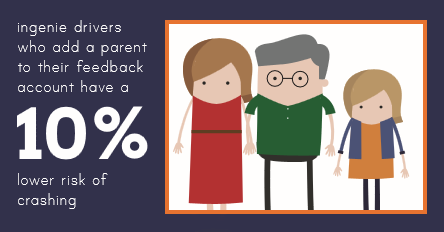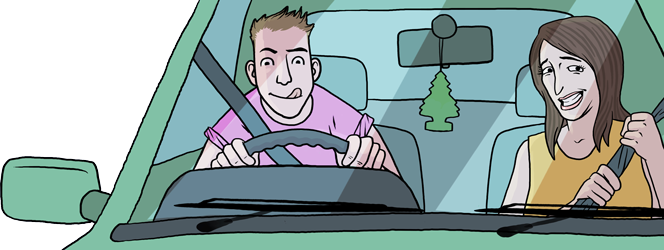
Why do young drivers crash?
An in-built disadvantage
A young driver’s risk assessment centre (the frontal cortex) hasn't reached full maturation yet and won't until they're about 25. That means it a) doesn't always detect a dangerous situation and b) can't react automatically to a hazard like your brain can.
It’s simple biology: the neural processes that detect risk aren't fully grown yet. There's also evidence that experiencing risky situations lets the human brain lay out pathways that connect a problem with a solution instinctively, which may not have happened to a new driver yet.
The most critical time for new drivers is during their first 2 weeks on the road, because they don’t have this huge store of problem-solution pathways yet.
Over-confidence
Although this is linked to not having a fully developed frontal cortex, it's also a cultural thing. Young people are taught that freedom, adventure and independence are reached with car keys, so once they've got them in their hand, it's easy to think "That's it, I'm sorted."
Sadly we know that the driving test pass isn't a certificate of excellence; learning to drive continues way past that day.
Too much haste, way too much speed
For a lot of young people, learning to drive is a race. They're desperate to pass, terrified by how much driving lessons cost and just want it to be over already.
The Driver and Vehicle Standards Agency recommends 47 hours of lessons and 20 hours of private practice - but a study we did last year showed that a whopping 88% of young drivers don't get the necessary number of hours with an instructor.
What we can do about it
-
Support the learning process
We've put together the Parent's Guide because you're a vital part of the team that's going to make sure your child is a safe driver. Whether you're helping financially, giving them private practice or just cheering them on, your role is massive.
Among the drivers in our community, those who share their driving feedback with a parent have a 10% lower risk of crashing.
It just goes to show how much your involvement can impact your child's safety.

-
Make safe driving the obvious choice
Telematics insurance does 3 things: offers young drivers a financial incentive to drive well, gives them feedback on their driving to help them improve, and gives parents some peace of mind that their child has a co-pilot as they're growing their skills.
The telematics box we fit in our customers’ cars collects data on speed, acceleration, braking and cornering. We use this to work out the discounts on their premium, but also to provide regular feedback so they can improve. All the driver has to do is continue the good work they did with their driving instructor and they'll save money on their insurance.
-
Coach good driving
Over the last couple of years, we've also developed a team of psychology-trained advisers to contact drivers in our community whose driving data shows they need some extra help. We use an individual driving score out of 100 to let us know when a driver is a crash waiting to happen. Then we step in to help prevent that crash.
The Driver Behaviour Unit (DBU) are all young drivers themselves, so when they get in touch it’s not a telling off - just a helpful nudge in the right direction. We've seen that 90% of drivers improve within a month of their quick conversation with a DBU adviser.
Next:
How do YOU drive? Find out how your driving can affect your child's.
Support the learning process
We've put together the Parent's Guide because you're a vital part of the team that's going to make sure your child is a safe driver. Whether you're helping financially, giving them private practice or just cheering them on, your role is massive.
Among the drivers in our community, those who share their driving feedback with a parent have a 10% lower risk of crashing.
It just goes to show how much your involvement can impact your child's safety.

Make safe driving the obvious choice
Telematics insurance does 3 things: offers young drivers a financial incentive to drive well, gives them feedback on their driving to help them improve, and gives parents some peace of mind that their child has a co-pilot as they're growing their skills.
The telematics box we fit in our customers’ cars collects data on speed, acceleration, braking and cornering. We use this to work out the discounts on their premium, but also to provide regular feedback so they can improve. All the driver has to do is continue the good work they did with their driving instructor and they'll save money on their insurance.
Coach good driving
Over the last couple of years, we've also developed a team of psychology-trained advisers to contact drivers in our community whose driving data shows they need some extra help. We use an individual driving score out of 100 to let us know when a driver is a crash waiting to happen. Then we step in to help prevent that crash.
The Driver Behaviour Unit (DBU) are all young drivers themselves, so when they get in touch it’s not a telling off - just a helpful nudge in the right direction. We've seen that 90% of drivers improve within a month of their quick conversation with a DBU adviser.









